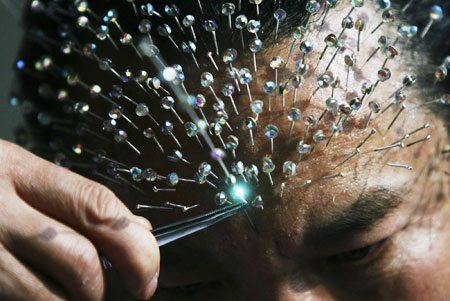Category: Acupuncture
The Cargo Cult of Acupuncture
Bloodletting, of course, was a major aim of early vessel therapy and is frequently described in the Su wen.1 Paul U Unschuld “Cargo cult” is a metaphor that describes the act of imitating an activity or a practice without any insight into the underlying principles. In the literal sense, it refers to a magico-religious practice observed in tribal societies, where the members...
Short Attention Span SBM
The bar on this blog is set high. The entries are often complete, with no turn left unstoned. Yet, not every topic needs the full monty with every post. The blog has extensive evaluations on many topics, and new medical literature doesn’t require another complete analysis. Many new articles add incrementally to the literature and their conclusions need to be inserted into...
Why bother?
It can be rather frustrating to refute the same old canards about alternative medicine. There’s always been argument as to whether this is even useful. Critics (some verging on “concern troll-ism”) argue that skeptics are convincing no one, others that we are too “dickish”. The first view is overly pessimistic (re: our impact), the second overly optimistic (re: the benign nature of...
“Integrative” oncology: Trojan horse, quackademic medicine, or both?
One of the main topics that we’ve covered here on this blog over the last couple of years is the relatively rapid, seemingly relentless infiltration of pseudoscience into what should be bastions of science-based medicine (SBM), namely medical schools and academic medical centers promoted by academics who should, but apparently don’t, know better. From the very beginning, we’ve written numerous posts about...
NEJM and Acupuncture: Even the best can publish nonsense.
I realize that the New England Journal of Medicine (NEJM) review of acupuncture has already been covered by Drs. Gorski and Novella. But my ego knows no bounds; so I thought I would add my two cents, especially since this review, more than any paper I have read, generates a deep sense on betrayal. There was a time when I believed my...
Acupuncture Pseudoscience in the New England Journal of Medicine
Here is the conclusion quoted from a recent New England Journal of Medicine (NEJM) review article on acupuncture for back pain: As noted above, the most recent wellpowered clinical trials of acupuncture for chronic low back pain showed that sham acupuncture was as effective as real acupuncture. The simplest explanation of such findings is that the specific therapeutic effects of acupuncture, if...
Credulity about acupuncture infiltrates the New England Journal of Medicine
One of the things that disturbs me the most about where medicine is going is the infiltration of quackery into academic medicine. So prevalent is this unfortunate phenomenon that Doctor RW even coined a truly apt term for it: Quackademic medicine. In essence, pseudoscientific and even prescientific ideas are rapidly being “integrated” with science-based medicine, or, as I tend to view it,...
No Education? No Training? No License? No Problem!
When Daniel David Palmer, the inventor of chiropractic, and his acolytes first took up the practice of chiropractic, around the turn of the last century, they were jailed for the unlicensed practice of medicine. If history had left them there, we might not be fighting a continuing battle with the pseudoscience that is “alternative” medicine today. Unfortunately, the Kansas legislature intervened on...

Another overhyped acupuncture study misinterpreted
Perhaps the most heavily studied of “alternative medicine” modalities is acupuncture. Although it’s hard to be sure as to the reason, I tend to speculate that part of the appeal to trying to do research in this area is because acupuncture is among the most popular of actual “alt-med” modalities, as opposed to science-based medical modalities co-opted by believers in alt-med and...
Potential New Mechanism of Pain Relief Discovered
The development of drugs and other treatments for specific symptoms or conditions relies heavily on either serendipity (the chance finding of a beneficial effect) or on an understanding of underlying mechanisms. In pain, for example, there are limited ways in which we can block pain signals – such as activating opiate receptors or inhibiting prostaglandins. There are only so many ways in...

